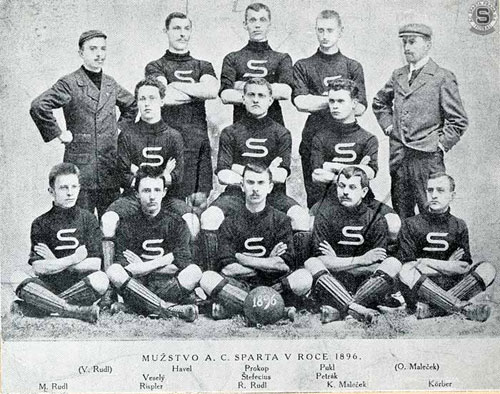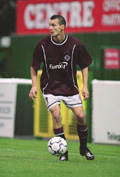|
|
|
|
Historical Names Of The Club |
||||
 (Above)The First Ever Sparta Prague Team In late 1893, a small group of young people around three brothers, Václav, Bohumil and Rudolf Rudl, had the idea of establishing a sports club. On November 16, the founders approved the club´s statute and one month later, on December 17, the first general assembly took place. Soon after that, Athletic Club Sparta came up with a three-colour banner, where blue symbolises Europe, the reasons for the yellow are not known any more, and red is the symbol of the royal city. At the very beginning of the club´s football history, the players used to wear black jerseys with a big "S" on the front side. Then they played for two years in black-and-white striped jerseys to which the club returned to in 1996, currently using them as a reserve set. However, in 1906 the club president Dr. Petřík was in England where he saw the famous Arsenal in London play with their red jerseys and decided to bring one set to Prague. At that time he did not realise he was setting up one of the club´s biggest traditions. Along with red jerseys, Sparta players wear white shorts and black socks. Shortly after World War I, a team was put together that triggered off the fabulous period of the twenties and thirties referred to as "Iron Sparta". A football league in Czechoslovakia was established in the mid-twenties; right from the start, Sparta started collecting title after title. Many years have passed, but football fans still recall the names of the players of that period with respect and admiration: Peyer Hojer Perner Káďa Kolenatý Červený. A few years later, some no less famous names appeared, such as Hochman, Burgr, Hajný, Šíma, Silný, Čtyřoký, Košťálek and mainly Oldřich Nejedlý, the top scorer at the 1934 World Cup. Shortly before this most fabulous era kicked off, Vlasta Burian, the man who later became the king of Czech comedians played for the club. The milestones of the first golden period of the club´s history are two Central European Cup titles, which in the twenties and the thirties enjoyed recognition and respect similar to that of today´s Champions League. Sparta´s three titles are definitely important milestones in the cup´s history. After two triumphs in 1927 and 1935, the third only came in 1964. At that time, however, the cup´s importance was gradually falling in the light of other European cups. Golden periods took turns with years when Sparta fans only nostalgically remembered the "good old times". After substantial changes driven by the socialist regime, bringing frequent changes of the club´s name rather than achievements to be proud of, the title in 1954 was the last one before a long period of misery. Only the great era of the team around Kvašňák in the nineteen-sixties brought back memories of the club´s golden years. There are still many people who recollect the era of Kvašňák Tichý and Mašek. Those were the days when Sparta hosted the biggest number of fans in its history, because at that time the stadium was able to accommodate almost forty thousand. All three above-mentioned heroes were part of the national team that finished second at the 1962 World Cup in Chile. Those who remember still get goose bumps when they think of the year 1975. Up until then, Sparta was the only club that had never been relegated to the second division. In 1975, due to a number of circumstances, the team had to leave the league. The one-year loyalty test was a success, the key matches crucial for the club´s comeback to the elite were sold out and happiness returned to the grandstands. Nevertheless, the feeling of breath-taking glory brought by a league title returned to Letná only in the early eighties. The team built around Chovane Berger Hašek Skuhravý and Griga was almost undefeatable, winning league titles as if there was no other competition. In 1983/1984, the team got as far as the UEFA Cup quarterfinal, in the early nineties this successful era was followed up by the next generation of players such as Siegl Horňák Němeček Frýdek Němec Kouba etc. Sparta has accomplished a number of considerable achievements internationally. Historians still say the most glorious were the two Central European Cup titles in the period of "Iron Sparta". From a contemporary fans´ point of view, the biggest achievement is probably Sparta´s performance in "year zero" of the Champions League in 1992/1993. Sparta defeated Glasgow Rangers, then Olympique Marseille and got to the semi-final group. Playing FC Barcelona, Dynamo Kiev and Benfica Lisbon, Sparta finished second. As opposed to today´s system, only the group winner got to the final. Being second in the group, Sparta was unofficially Europe´s third to fourth best team. In 1997/1998, as well as two years later, Sparta made the last sixteen best teams on the old continent. Sparta, usually along with Slavia, has always been a base for the national team; Sparta players contributed to the biggest achievements of the Czechoslovak and Czech national teams. It all started in 1934, when Oldřich Nejedlý was the top scorer at the World Cup in Rome; four years later, seven Sparta players were part of the national team at the World Cup in France. In 1962 Kvašňák and Tichý played for the silver team in Chile. In 1990 in Italy where the national team got as far as the quarterfinal the team´s play was mainly created by Chovanec Bílek Hašek and other Sparta players such as Skuhravý who became a star of the Italian league shortly after the championship. Sparta players also contributed to the last big achievement of the already independent Czech Republic team in 1996. Kouba Frýdek and Horňák returned to Letná from England with silver medals. On top of that the team was coached by Dušan Uhrin who had spent his best years at Sparta and Pavel Novotný came to Sparta two years later. For More History........
|
Brief History
1893 the club was founded on November 16 1906 for the first time the team plays in red jerseys one of Spartas symbols 1919 the beginning of the era called Iron Sparta 1927 1935 1964 Central European Cup winners 1954 Sparta will have to wait for a league title for 11 years 1965 1967 a return to glory, two titles 1975 the first and the last relegation; the club´s black year 1983 new glorious era 14 league titles to follow 1991/1992 - the Champions League year zero Sparta gets to the semi-final group 1934 1938 1962 1990 1996 Sparta is the main supplier of players to the national team  Vladamir Labant who recently transferred to West Ham United of England |
|||